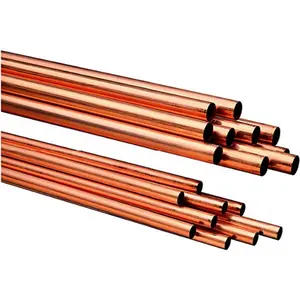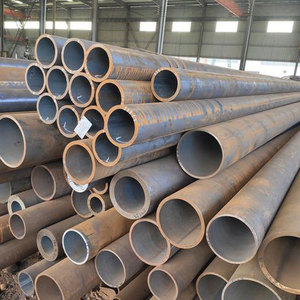(42290 products available)
































































































































































































There are different pipes with an 8mm diameter. These pipes are used in various applications and industries. They can be classified into different types based on the material from which they are made. The classification includes:
8mm Plastic Pipe
An 8mm plastic pipe is used for plumbing work with the 8mm plastic pipe being a common size for condensate drainage in HVAC systems. Plastic pipes are lightweight and easy to install. They are available in various materials. These materials include:
Polyvinyl chloride (PVC) - An 8mm PVC pipe is widely used in construction. It is popular in the transportation of water and sewage. The pipes are lightweight, durable, and resistant to corrosion. They are also easy to install and joint. PVC pipes are usually white or grey in color. They are classified into different schedules or diameters.
Polyethylene (PE) - An 8mm PE pipe is mostly used for water supply lines, irrigation systems, and industrial applications. The pipes are resistant to corrosion and chemicals. They are also flexible and can be buried directly in the ground without protection. PE pipes are usually black with colored stripes that indicate their intended use.
Cross-linked polyethylene (PEX) - An 8mm PEX pipe is used for water supply lines and radiant heating systems. The pipes are flexible and easy to install. They are also resistant to heat and chemicals. Pex pipes are color-coded for hot and cold water distribution (red for hot and blue for cold).
8mm Metal Pipe
Metal pipes are used in a wide range of applications. These applications include structural support, fluid transportation, and electrical conduit. They are usually strong, durable, and resistant to high temperatures and pressures. Metal pipes are also available in different alloys. They include:
Steel - An 8mm steel pipe is used in construction, oil and gas, plumbing, and HVAC applications. The pipes are strong, durable, and able to withstand high pressures and temperatures. They are also resistant to corrosion. Steel pipes are classified into galvanized (for corrosion resistance) and black (for plumbing and oilfield use).
Stainless steel - An 8mm stainless steel pipe offers high corrosion resistance. It is used in food processing, medical, chemical, and plumbing applications. The pipes are durable, hygienic, and able to withstand high pressures and temperatures. Stainless steel pipes are classified into grades 304 and 316 (based on corrosion resistance).
Cooper - An 8mm copper pipe is commonly used for plumbing, HVAC, and electrical applications. The pipes are lightweight, durable, and resistant to corrosion. They are also excellent conductors of heat and electricity. Copper pipes are classified into Type K (thick-walled for high pressure), Type L (medium-walled for general use), and Type M (thin-walled for low pressure).
8mm pipes are used in a variety of applications. Some of these applications are discussed below:
Plumbing:
8mm pipes are commonly used in plumbing systems for water supply lines, hot water distribution, and connecting fixtures like taps, toilets, and showers. Their small diameter is suitable for low-flow applications, such as in residential settings.
Refrigeration:
These pipes are used in refrigeration systems to transport refrigerants between components, such as condensers, evaporators, and compressors. They help maintain the cooling efficiency of refrigerators, freezers, and air conditioning units.
Hydraulic Systems:
8mm metal pipes are used in hydraulic systems to transmit hydraulic fluid between pumps, motors, and cylinders. They are essential in machinery and equipment requiring controlled movements through hydraulic power, such as excavators and forklifts.
Gas Supply:
These pipes are used in natural gas or propane distribution systems to transport gas to appliances such as stoves, water heaters, and furnaces. Their small diameter is suitable for low-pressure gas lines commonly found in residential and commercial properties.
Electrical Conduits:
8mm pipes are used as conduits in electrical installations to protect and route electrical wires in walls, ceilings, and underground. They are especially useful in situations where wires need to be pulled through tight spaces, such as in HVAC systems.
Drainage:
They are also used in drainage systems to transport wastewater and stormwater. Their smooth interior surface allows for efficient flow and easy maintenance. Additionally, their corrosion-resistant properties make them suitable for handling various types of wastewater.
HVAC Systems:
These pipes are used in heating, ventilation, and air conditioning (HVAC) systems for the distribution of water-based heating or cooling systems. They are also utilized in the transportation of compressed air and other fluids in commercial and industrial settings.
There are several applications of 8mm pipes in various industries. These applications include:
Application Requirements:
Determine the application in which an 8mm pipe will be used. Different applications have different requirements. For example, a fuel line, hydraulic system, or water supply pipe has unique pressure ratings, temperature ranges, and fluid compatibility.
Material Selection:
8mm pipes are made of different materials, each with benefits. Common materials are copper, plastic, and steel. The application requirements will determine the best material for an 8mm pipe. Copper pipes are suitable for water supply lines and plumbing applications. Copper pipes are popular because they resist corrosion and are durable. Plastic pipes are lightweight, easy to install, and resistant to corrosion. They are used for water supply lines and irrigation systems. Steel pipes are strong and have high pressure and temperature resistance. They are used in gas lines and industrial applications.
Pressure Rating:
Ensure the 8mm pipe's material and thickness can withstand the system's pressure. Each pipe material has a different pressure rating. For example, copper, plastic, and steel pipes have different pressure ratings.
Compatibility of Fluids:
Ensure the pipe material is compatible with the fluids or gases transported. This prevents corrosion or leakage. For example, liquid ammonia compatible pipes can be selected based on the transported liquid.
Check for Certifications and Standards:
Ensure the 8mm pipe meets industry standards and regulations. This ensures safety and quality. Different industries have different standards. For example, construction and plumbing industries have different certifications.
Evaluate the Environment:
The environment where the pipe is installed affects the pipe material's durability. For example, consider temperature, humidity, and presence of chemicals or corrosive materials. Pipes exposed to high temperatures require materials with high-temperature resistance. Pipes in a corrosive environment require materials resistant to corrosion.
Pipe Thickness:
Consider the wall thickness of the 8mm pipe. Thicker walls offer higher strength and pressure resistance. For applications with high pressure, select a pipe with thicker walls. Pipes with thinner walls are lighter and cheaper, but have lower pressure ratings.
Quality and Manufacturer's Reputation:
Choose pipes from reputable manufacturers. This ensures quality and reliability. Consider reviews and testimonials from previous customers.
Q1: What does an 8mm pipe mean?
A1: An pipe that is 8mm in diameter means that the outside diameter of the pipe is 8mm. However, the outside diameter can vary depending on the type of pipe. For example, an 8mm copper pipe has an outside diameter of 8mm. An 8mm galvanized steel pipe has an outside diameter of 10.5mm. An 8mm plastic (PVC) pipe has an outside diameter of 8mm.
Q2: How long do 8mm pipes last?
A2: The lifespan of a pipe depends on the type of pipe and material. PVC pipes can last for 50 to 100 years, copper pipes for 50 to 100 years, and galvanized or steel pipes for 20 to 50 years.
Q3: Are 8mm pipes suitable for plumbing?
A3: An 8mm pipe is suitable for plumbing in some situations. For example, an 8mm copper pipe is commonly used for plumbing. However, an 8mm pipe is not ideal for most plumbing applications because it has a small diameter. As a result, it cannot transport a lot of water. Copper pipes of 15mm and above are popular for plumbing because they have a higher flow capacity.
Q4: What is the wall thickness of an 8mm pipe?
A4: The wall thickness of an 8mm pipe varies depending on the type of pipe. For example, the wall thickness of an 8mm copper pipe can range from 0.6mm to 1mm or more. The wall thickness of a pipe determines its strength and pressure rating. A thicker wall means a stronger pipe.
Q5: What is the pressure rating of an 8mm pipe?
A5: The pressure rating of an 8mm pipe varies depending on the material and type of pipe. For example, a 8mm copper pipe can be used for high-pressure applications because it has a high pressure rating. The rating is usually indicated in a chart.